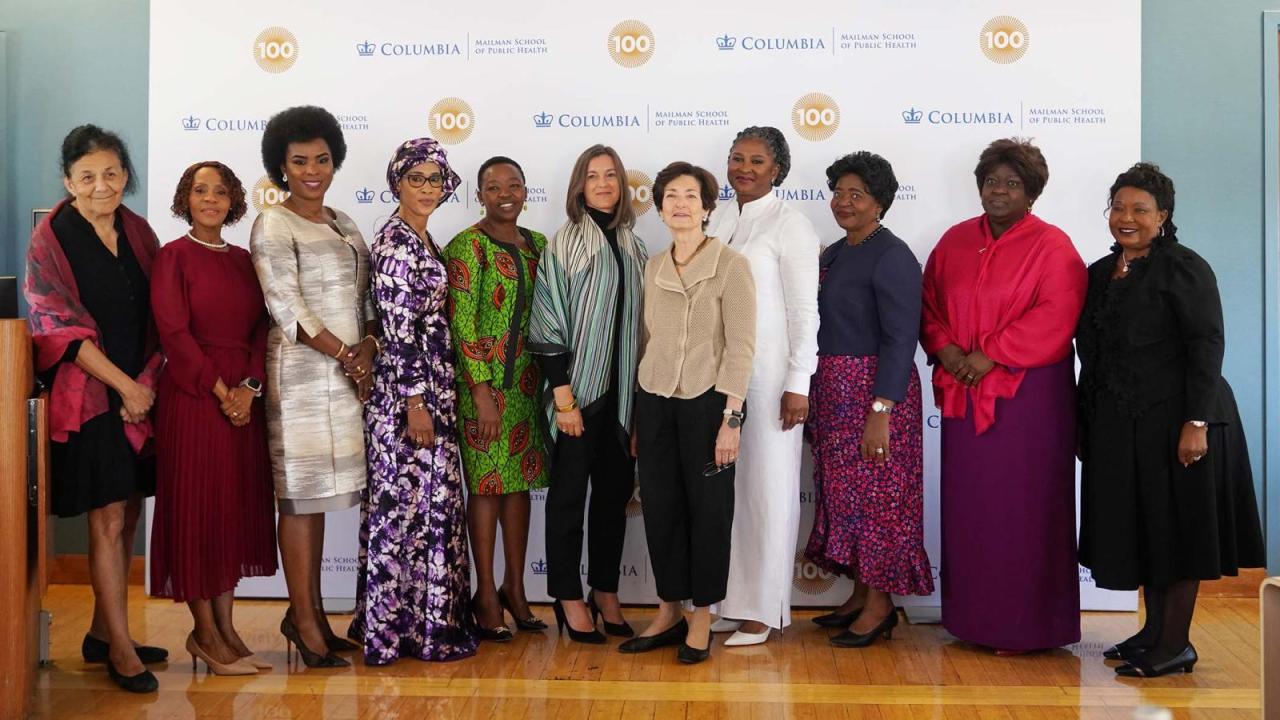
The First Ladies of Africa congregated for the 27th Ordinary General Assembly of Organization of African First Ladies for Development (OAFLAD), today, 19 February 2023 at the Headquarters of the African Union. The Assembly witnessed that the First Ladies of Africa are joining their voices and offering continent-wide leadership in terms of advocacy in the areas of HIV and a broad range of maternal and child health interventions.
Addressing the Assembly, H.E. Amb. Minata SAMATE CESSOUMA, AU Commissioner for Health, Humanitarian Affairs and Social Development (HHS) depicted in today’s health ecosystem, collaboration and strategic partnerships are key to strengthening health systems by integrating talent, expertise, technology and purpose.
The Commissioner for HHS reinforced that the COVID-19 pandemic has allowed increased willingness and openness in strengthening public and private partnerships that can be sustained beyond COVID-19 responses.
Reaffirming AU’s commitment through the Department of HHS, H.E. the Commissioner said: “Through several flagship projects and activities, the HHS Department, working with other key AU organs and departments, has taken a strong stance to promote women and girls empowerment in different socio-economic areas. This has been guided by Aspiration 6 of Agenda 2063: ‘An Africa whose development is people-driven, especially relying on the potential offered by its women and youth.’ Understanding and addressing pre-existing and novice gender gaps in our societies today, remains crucial to ensure gender equity for women and girls in our continent.”
Concluding her address, Amb. Minata CESSOUMA outlined that the Africa Union Commission has worked with various stakeholders to promote the wide availability of quality, safe, effective, affordable and sustainable high-impact health interventions that benefit the continent and hoped that the 27th General Assembly of OAFLAD will pave the way towards substantial partnerships.
Opening the 27th Ordinary General Assembly of OAFLAD which has the theme: “Closing gaps in Gender Equity” and welcoming the First Ladies of Africa who have decorated themselves with good deeds to improve the lives of vulnerable populations in their respective countries, Mrs. Zinash Tayachew, First Lady of the Federal Democratic Republic of Ethiopia (FDRE), underlined that gender equality is critical to the achievement of Agenda 2063 and Sustainable Development Goals. She attested that the Ethiopian government has made numerous efforts to close gender gaps over the last four year. H.E. Mrs. Zinash Tayachew outlined that the Office of the First Lady of Ethiopia in the past four years built 27 schools that prevented girls from dropping out of school due to distance, built bread factories in 12 cities, constructed shelter for orphans, provided smart glass to over 2000 visually challenged people and is currently constructing a state-of-the-art boarding school that accommodates 300 blind students.
H.E. Madam Monica Geingos, First Lady of the Republic of Namibia and President of OAFLAD in her opening remarks highlighted the work and impact of OAFLAD providing continent-wide leadership advocating for policy and social change. She outlined that OAFLAD worked with Africa’s most vulnerable including women and children infected and affected by the AIDS epidemic; mobilized communities to make significant contribution to the prevention and elimination of HIV and AIDS and the promotion of maternal and child health; The First Ladies championed impactful interventions in PMTCT, Paediatric AIDS, Adolescent AIDS and other activities on the AIDS response including stigma and discrimination; OAFLAD significantly raised the profile of maternal, new-born and child health (MNCH) and HIV issues through high-level platforms; OAFLAD has contributed to raising greater public awareness about prevention, early diagnosis and treatment options for cervical cancer; collaborated and created synergies with partners who share OAFLAD’s vision enhanced the power of OAFLAD’s advocacy efforts and applied innovative approaches including campaigns provided platforms for awareness creation, resource mobilization and social dialogue in HIV, maternal, neo-natal and child health issues.
Looking forward, the President of OAFLAD, H.E. Madam Monica Geingos, anticipated to focus on effective implementation and evaluation of OAFLAD’s strategic priorities; regional collaboration aligned with country priorities; leveraged partner opportunities and regional convening and enhancing the operational efficiency of the organization and launch a unifying campaign that mobilized First Ladies and development partners around the issue of closing the gender gap in Africa.
Other key speakers of the official opening Ceremony included H.E. Madame Rachel Ruto, First Lady of the Republic of Kenya; Dr. Seth Berkley, CEO, GAVI the Vaccine Alliance; Mrs. Winnie Byanyima, UN Under Secretary General and UNAIDS Executive Director and Dr. Matshidiso Moeti, Regional Director for Africa, WHO.
About the African Union:
The African Union spearheads Africa’s development and integration in close collaboration with African Union Member States, the Regional Economic Communities and African citizens.
The AU Vision is to accelerate progress towards an integrated, prosperous and inclusive Africa, at peace with itself, playing a dynamic role in the continental and global arena, effectively driven by an accountable, efficient and responsive Commission.
About OAFLAD:
In 2002, First Ladies of Africa came together to form the Organization of African First Ladies against HIV/AIDS (OAFLA). OAFLA currently named as the Organization of African First Ladies for Development (OAFLAD) is an advocacy organization where First Ladies of Africa seek to leverage their unique position to advocate for policies that make health services accessible and laws that boost women and youth empowerment. First Ladies of Africa reinforce favorable policies and programs through advocacy, resource mobilization and development of partnerships with all stakeholders at all levels. First Ladies engage in various community-level activities to sensitize communities and create awareness on health risks and policies.